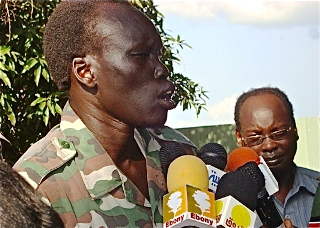S. Sudan army says rebel leader Yau Yau agreed to ceasefire
January 7, 2014 (JUBA) – South Sudan’s army claimed on Tuesday that David Yau Yau, who has been leading a rebellion out of Pibor county in Jonglei state since April 2012, has agreed to cease hostilities against government forces.

The military on Tuesday said Yau Yau had responded to an amnesty offer from president Salva Kiir, who is currently battling a new rebellion that began last month when large sections of the army defected in Jonglei, Unity and Upper Nile states.
The ceasefire with Yauyau’s group “is a good step toward realisation of peace and stability”, Philip Aguer, South Sudan army (SPLA) spokesperson told reporters on Tuesday.
He did not give specific details of how Yau Yau had responded.
Religious and community tasked by the president to mediate between government and the rebels in August 2013 are yet to release statement denying or confirming whether it was their efforts or not that resulted to the rebels’ acceptance of ceasefire.
Sudan Tribune was unable to independently verify whether Yau Yau had indeed accepted cessation of hostilities.
Aguer said on Monday that the country’s defense minister, Kuol Manyang Juuk, had instructed government troops “to declare a ceasefire between SPLA and David Yau Yau.”
“David Yau Yau had for the last two months undertaken steps for confidence building and have been cooperating with SPLA forces in Pibor and Likuangole. This declaration of ceasefire is an enhancement for the process of settlement of the conflict in the area”, he remarked.
The military spokesperson said the decision was reached by the government in recognition of negotiations that have been ongoing between the government and Yau Yau mediated by religious leaders under the auspices of retired Catholic Archbishop Paride Taban.
Aguer explained that the decision would provide access for provision and delivery of humanitarian assistance to the conflict-affected communities living in and around Pibor county, as the cessation of hostilities would create a conducive atmosphere and allow humanitarian services.
Should the reports be correct, Yau Yau is expected to formally sign a ceasefire agreement with the government.
Meanwhile, observers and analysts say acceptance of the ceasefire will eventually contribute to the realisation of peace and stability in the area.
(ST)
